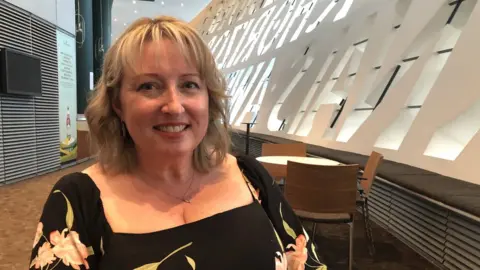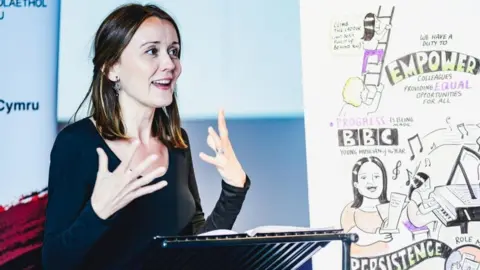Long Covid: People turning to opera to manage illness
 BBC
BBCPeople suffering from long Covid have been turning to opera to aid their recovery.
Welsh National Opera performers are teaching breathing and vocal techniques to help overcome the long-term effects of the virus.
The rehabilitation scheme could also be used to help patients with other long-term health conditions.
Michele Roberts is one of the first people with long Covid to benefit from the breathing and singing classes.
Ms Roberts, from Rhondda Cynon Taf, caught Covid while working as an occupational therapist technician on the wards at the Royal Glamorgan Hospital in Llantrisant in March 2020.
Two weeks after catching the virus, her health deteriorated rapidly.
"My husband didn't think I was going to survive it. I refused to go to hospital. I thought: 'If I'm going to die then I'd rather die at home with him, in his arms', because obviously visiting wasn't allowed.
"It was six weeks where I can hardly remember anything. I was sleeping all the time, I couldn't wash, dress, shower. My whole life has been turned upside down."
Ms Roberts has never fully recovered from Covid and now lives with a condition known as long Covid which has prevented her from returning to work full-time and living the life she used to have.
She said: "Initially, it was really scary because I didn't know what was happening. I tried to go back to work but that didn't happen.
"You're left with all these headaches, pain around the eyes, still having the nerve pain, breathlessness and everything you do, you just feel really tired all the time like you can't get out of bed in the morning."
 Kirsten McTernan
Kirsten McTernanHaving decided to accept the changes to her health, Ms Roberts approached her health board. As a result she was referred to the Wellness with Welsh National Opera long Covid programme.
"The response to the programme has been amazing. The two pilot programmes have shown overwhelmingly positive results in terms of people's health and breathing and also improvements for the participants psychologically," said Emma Flatley, director of programmes and engagement at the Welsh National Opera.
"People have also avoided urgent trips to hospital by using the techniques and advice given."
Small groups of people participate in the hour-long sessions, led by a professional opera singer.
Soprano and voice animator Zoe Milton-Brown said: "As opera singers we focus a lot on breathing as efficiently as possible and we spend a long time learning how to do that.
"With all of these exercises we're hoping to share with people lots of different ways we've devised to help us keep our breathing grounded, to access our lungs and to use our diaphragms. All of the exercises have been devised with long Covid in mind to try to help people as much as possible to regain an efficient and relaxed breathing technique."
She said they aimed to help people feel like they were in control during the sessions.
Ms Roberts said: "I remember thinking I didn't want the first session to finish. But I can understand why it was only an hour because I was shattered after. It's not just about singing. It's about relaxation and massaging which you can take into your every day life.
"My husband says he has noticed a marked improvement. Not just in my breathing but in my wellbeing because I've been in some dark places. I can talk better to people now because usually I'd be stopping to catch my breath all of the time."
The pilot programme is being offered through Cwm Taf, Cardiff and Vale and Betsi Cadwaladr health boards.
"Singing to improve health and lung health was already an established area before Covid," said Sofia Harries, operational lead for the long Covid rehabilitation service at Cwm Taf health board.
"The service is a way of bringing people with a similar experience together.
"The rehab education we're giving people is very prescriptive, especially with the breathing - it's very pragmatic.
"But the singing also gives people the opportunity to enjoy their rehab in a subconscious way where they're not thinking about diaphragmatic control."
The Welsh government is providing an additional £5m for new long Covid rehab services and it is hoped health boards will be able to expand the model to treat and support people with other long-term conditions, including multiple sclerosis and myalgic encephalomyelitis.
